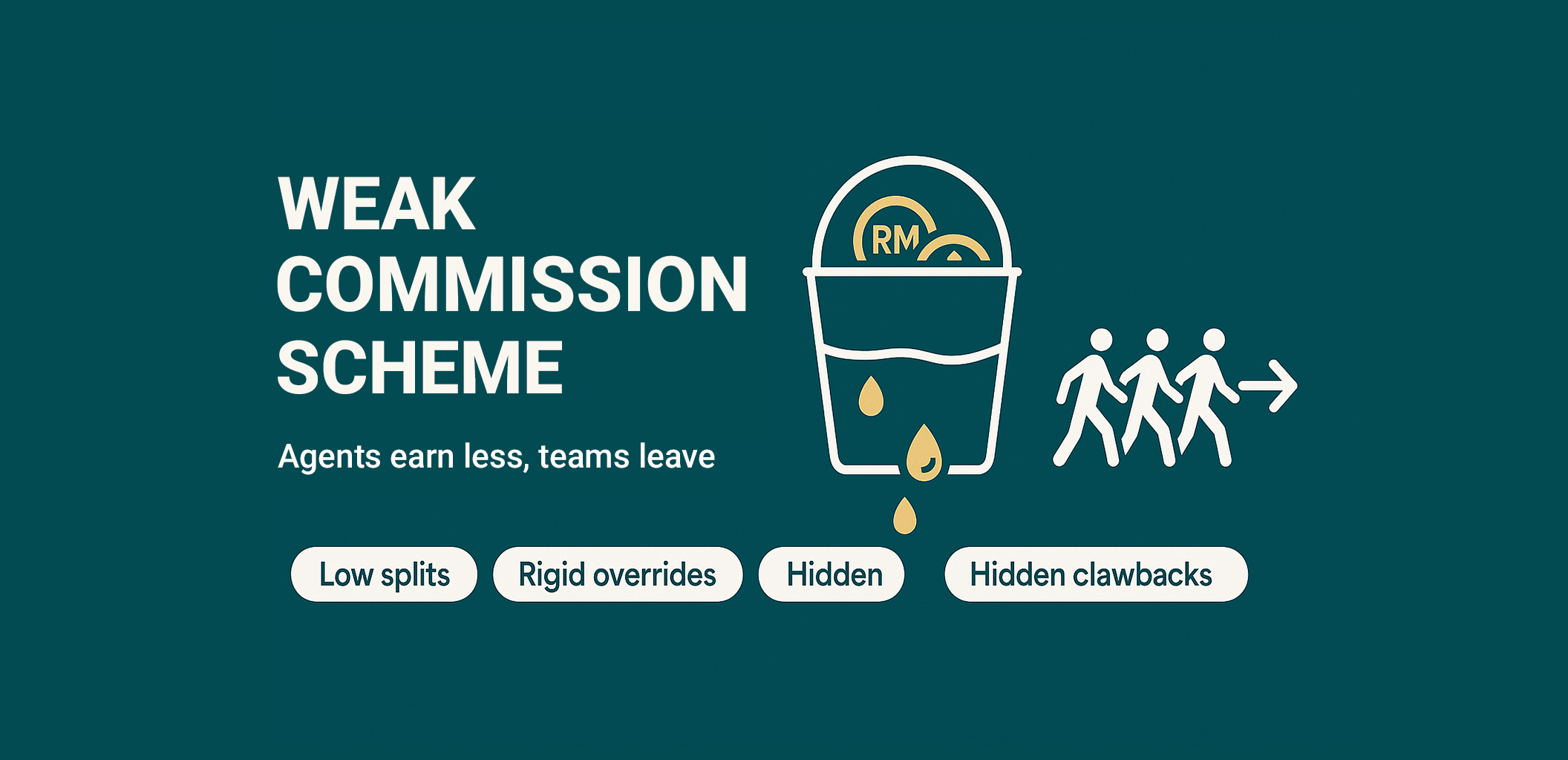Why Most Agency Bosses Fail at Commission Schemes

Most agency bosses don't fail because they lack hustle; they fail because their commission structure silently works against their business. The common mistake is simple: they copy the scheme from a previous company, tweak a few percentages, and hope for the best. The fundamental structure—who gets paid what, when, and how—remains largely unchanged.
Over time, the market shifts. Projects and sub-sales change, rental renewals behave differently, new team leaders emerge, and external co-broking grows. The old scheme no longer matches reality, but changing it feels risky. Leaders fear the politics, the impact on agents, and the potential for a small change to break trust or ruin margins. Many also avoid change because traditional ERPs charge steep customization fees for even minor rule adjustments. This is the exact problem ListingMine ERP was built to solve.
The Copy-Paste Trap
A commission scheme is an incentive system in disguise. A structure that worked at your last company might have been designed for a very different mix of leads, project pipelines, branch networks, or culture. When you transplant it without adapting, you create hidden friction. Agents will prioritize the deals the scheme rewards, cherry-picking high-paying work and avoiding tasks that are under-rewarded. Internal co-broking becomes a negotiation instead of a collaboration. Your finance team wastes time reconciling spreadsheets and WhatsApp messages, and disputes rise because there’s no official record of what was agreed upon.
The Fear of Change
Bosses aren't afraid of better math; they're afraid of instability. Changing a commission scheme affects culture, income expectations, and retention. Without the right tools to model the impact before rolling it out, the risk seems unacceptable. Without an audit trail, even a smart change can be misread as arbitrary. When every tweak requires a vendor's time and customization fees, change becomes a budget and timeline problem, not a leadership decision.
The Customization Tax
Legacy ERPs often hard-code their logic. This means any new scheme, cap, floor, or override triggers a paid "customization" project. Lead times stretch, and budgets swell. You end up managing critical exceptions with spreadsheets because the system can't evolve at the speed of the market. Paralysis becomes the default, while errors, disputes, and lost margins continue to accumulate.
What High-Performing Agencies Do Differently
Successful agencies treat their commission scheme as a living system. They start with simple principles—reward value creation, lock rules before work begins, and make finance the single source of truth—and then evolve the scheme as the market changes.
- Rentals, sub-sales, and projects get their own presets.
- Internal and external co-broking are handled cleanly.
- Overrides are capped, and floors and clawbacks are explicit and transparent.
- Most importantly, rules are versioned and a snapshot is taken at the time of assignment, so there is no debate later about "what we agreed."
How ListingMine ERP Creates Value
ListingMine replaces expensive customization with simple configuration. You can model complex schemes using building blocks like deal type presets, multi-upline overrides, caps and floors, and specific roles like introducer or PIC. You can duplicate these for different branches or projects without writing any code.
When a lead is assigned, the platform snapshots the scheme, so the rules can't change mid-deal. As milestones are hit, provisional payouts are calculated automatically. Finance approves payments with a maker-checker process, agents see their statements, and bosses can view roll-ups by team, branch, and project.
Every change is logged, and disputes fall because there's one source of truth. Since you're configuring instead of commissioning custom builds, you can evolve the scheme as the market changes—without paying a tax for every adjustment. We’ve helped our clients save over RM200,000 per year in customization fees alone. They can now update commission schemes in minutes, not quarters, giving them a significant competitive advantage over slower adopters.
Next Steps:
- Find out more on the Agency Boss page.
- Explore how the ERP works end-to-end.
- Check out our rollout options and pricing.











































































































